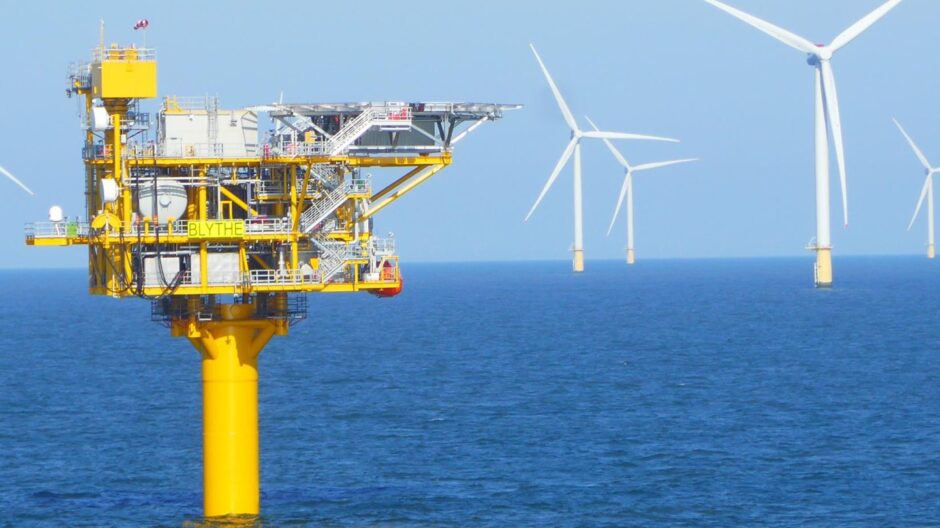
The windfall tax is an “appropriate mechanism” because North Sea oil and gas firms have “consistently failed to invest” in the energy transition, according to the head of a sustainable finance group.
UK Sustainable Investment and Finance Association (UKSIF) chief executive officer James Alexander said oil and gas firms are “increasingly the industries of the past”.
UKSIF has over 300 UK-based financial services members whose aim is to support sustainable investment.
“The windfall tax is an appropriate mechanism for taxing the record profits made by oil companies during the energy crisis, and is designed to fund catalytic public investment into the sustainability transition, which will create jobs that stand the test of time,” Alexander said.
“North Sea oil companies have consistently failed to invest in the transition towards renewables at the necessary scale and are increasingly the industries of the past.”
Alexander said the UK must look forward towards the “millions of skilled jobs” created by the energy transition, including in offshore wind.
“This is where the government must focus its resources and where investors must prioritise their financing,” he said.
North Sea windfall tax fears
His comments come as North Sea firms continue to vocally oppose plans by the Labour government to increase the rate of the windfall tax and remove “unjustifiably generous” investment allowances.
Chancellor Rachel Reeves also announced the government would extend the Energy Profits Levy (EPL) for an extra year to 2030.
The Treasury said there are no plans to change the availability of capital allowances, although they will be reduced, and that the government will retain decarbonisation investment allowances.
The announcement prompted a strong reaction from industry leaders, who said it would “hasten the demise” of the UK oil and gas sector and “kill” the supply chain.
Offshore unions including GMB and Unite have also criticised the windfall tax proposals, urging the government not to ignore the concerns of oil and gas workers.
In a bid to calm industry concerns, Treasury Minister James Murray met directly with oil and gas leaders and unions on Monday in Aberdeen.
He later told Energy Voice that Labour is committed to protecting jobs, and that Treasury officials will continue to meet with the sector ahead of the October budget.
But Offshore Energies UK (OEUK) chief executive David Whitehouse said Labour has “eroded trust” with North Sea firms.
Energy transition ‘huge opportunity’ for the UK
Responding to the OEUK comments, Alexander said the “delaying tactics” of oil and gas firm will “actively jeopardise” investment in the UK energy transition.
“Leading the way on the energy transition is a huge opportunity for the UK, and therefore we maintain that the focus must be on green growth,” he said.
“The delaying tactics of oil and gas companies will actively jeopardise the UK’s green leadership and our ability to attract international investment.
“If we continue to lose out, as we have done in recent years, tens of billions of green investment and the associated jobs and growth will simply go elsewhere.”
North Sea energy transition
In 2021, the UK oil and gas sector signed an agreement with the government to reach net zero emissions by 2050.
Under the North Sea Transition Deal, the sector agreed to invest in electrification, methane emissions reduction, hydrogen and carbon capture in return for government policy support.
Industry estimates put the potential investment into low-carbon energy projects from offshore firms at close to £200 billion by 2030.
However, the industry has attracted criticism for a lack of transparency over the extent of their investment in low-carbon energy.
Meanwhile, major firms like BP and Shell are increasingly scaling back their offshore wind investments amid accusations of “greenwashing“.
But OEUK maintains that without investment from the oil and gas industry the UK will simply import its energy transition from overseas, with higher associated emissions.
There are also concerns the windfall tax changes could lead to thousands of job losses, particularly in Scotland, putting renewable energy targets at risk.
Recommended for you


 © Shutterstock / Henk Honing
© Shutterstock / Henk Honing © Image: Euan Fraser/Aberdeen Renewable Energy Group
© Image: Euan Fraser/Aberdeen Renewable Energy Group